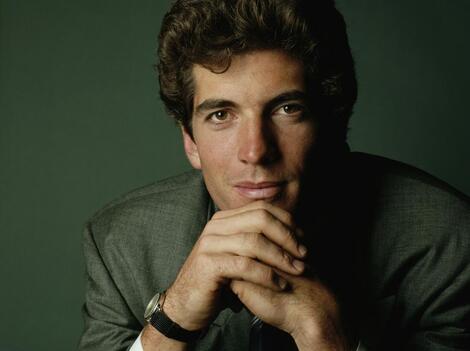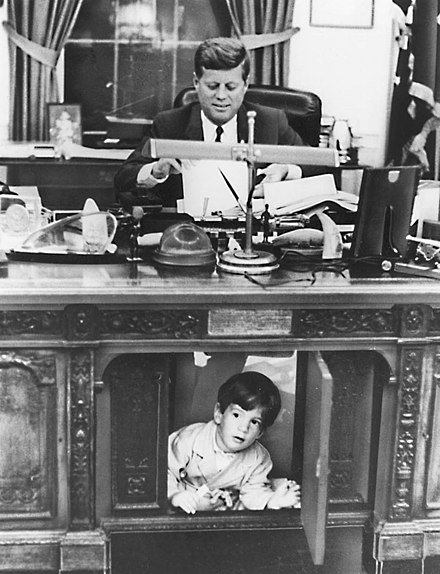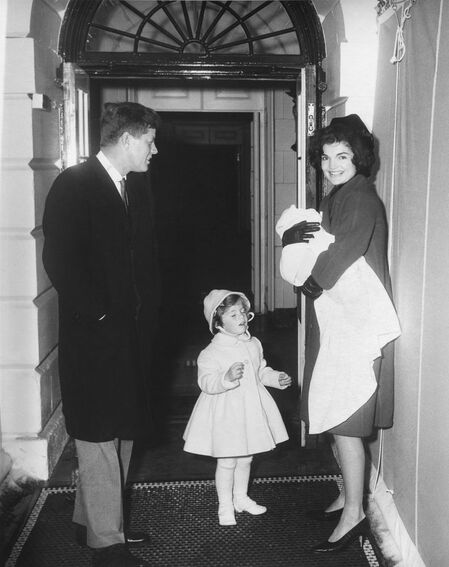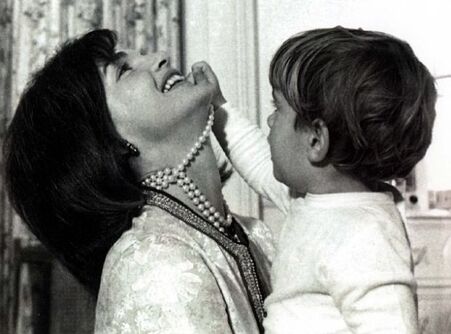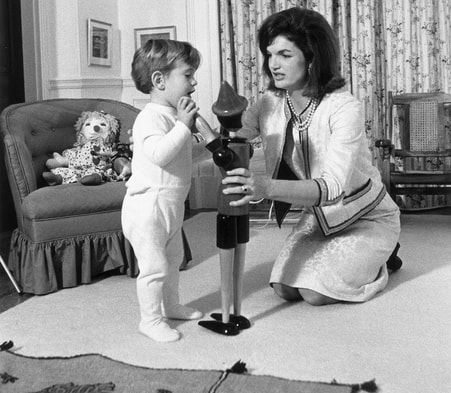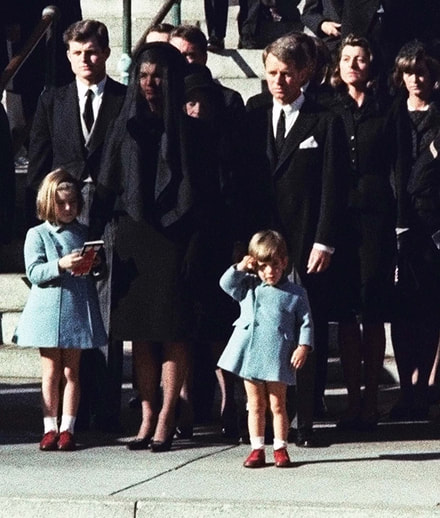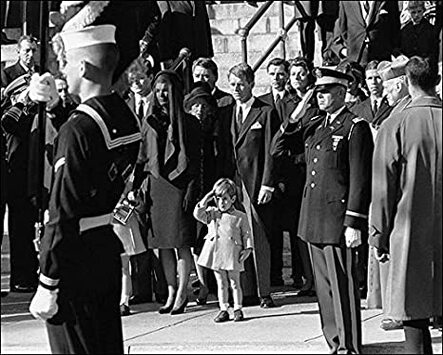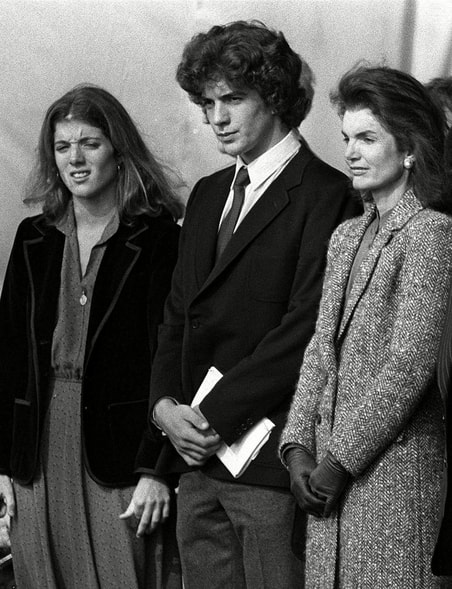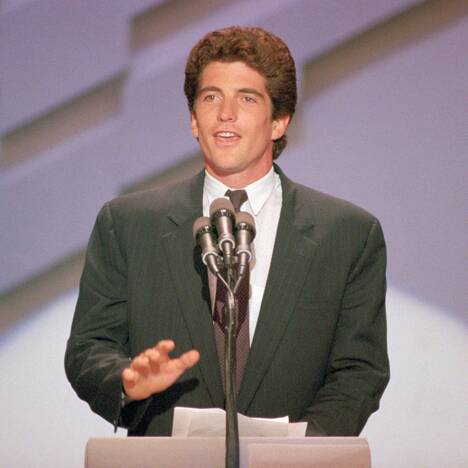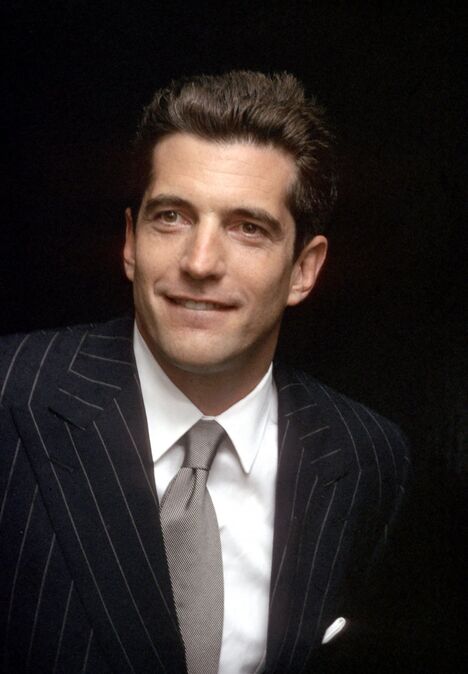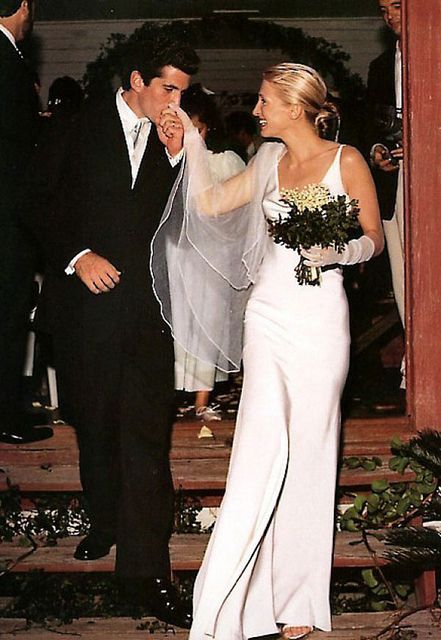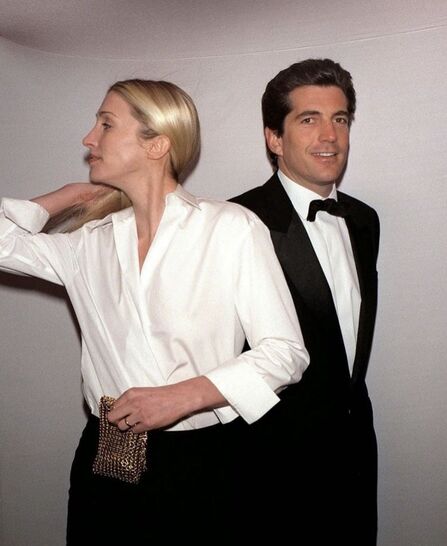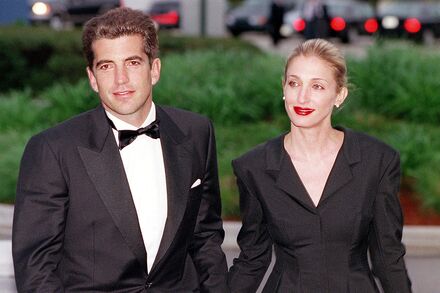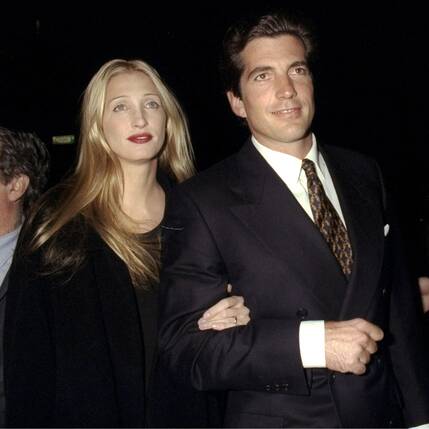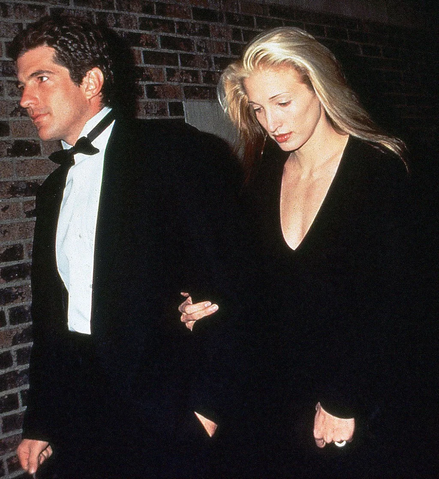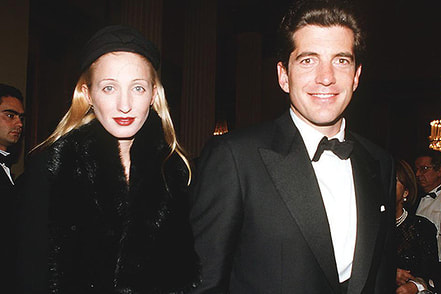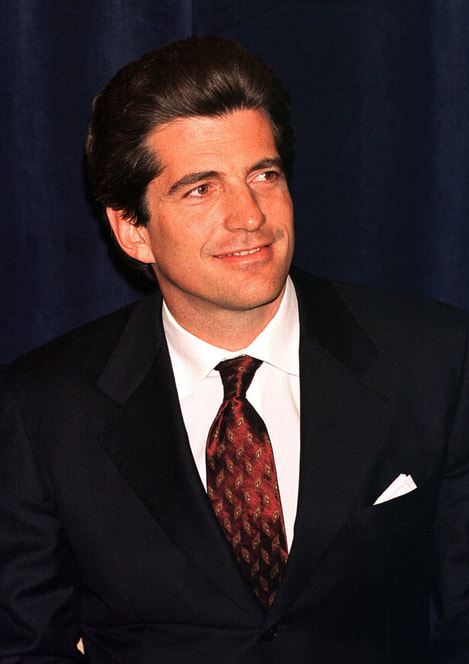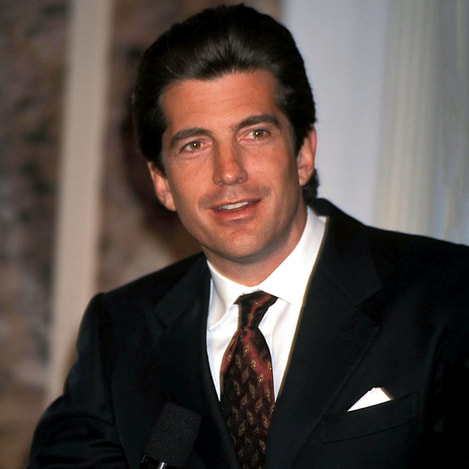ProfileJohn Fitzgerald Kennedy Jr. (November 25, 1960 – July 16, 1999), often referred to as JFK Jr., was an American lawyer, journalist, and magazine publisher. He was a son of the 35th President of the United States John F. Kennedy and First Lady Jacqueline Kennedy, and a younger brother of Caroline Kennedy. Three days after his father was assassinated, he rendered a final salute during the funeral procession on his third birthday. From his childhood years at the White House, Kennedy was the subject of much media scrutiny, and later became a popular social figure in Manhattan. Trained as a lawyer, he worked as a New York City assistant district attorney for almost four years. In 1995, he launched George magazine, using his political and celebrity status to publicize it. He died in a plane crash in 1999 at the age of 38 with his wife Carolyn Bessette. BiographyJohn Fitzgerald Kennedy Jr. was born at MedStar Georgetown University Hospital on November 25, 1960, two weeks after his father and namesake, Massachusetts senator John F. Kennedy, was elected president. His father took office eight weeks after John Jr. was born. John Jr. had an older sister, Caroline, and a younger brother, Patrick, who died two days after his premature birth in 1963. His putative nickname, "John-John", came from a reporter who misheard JFK calling him "John" twice in quick succession; the name was not used by his family. John Jr. lived in the White House during the first three years of his life and remained in the public spotlight as a young adult. His father John F. Kennedy was assassinated on November 22, 1963, and the state funeral was held three days later, on John Jr.'s third birthday. In a moment that became a famous scene of his life, John Jr. stepped forward and rendered a final salute as his father's flag-draped casket was carried out from St. Matthew's Cathedral. NBC News vice-president Julian Goodman called the shot taken by Stan Stearns"the most impressive...shot in the history of television". The family continued with their plans for a birthday party to demonstrate that the Kennedys would go on despite the death of the president. After President Kennedy was assassinated in 1963, Jacqueline Kennedy moved her family from Washington to New York City, in a luxury apartment on the Upper East Side of Manhattan, where Kennedy Jr. grew up. Kennedy attended private schools in Manhattan, starting at Saint David's School and moving to Collegiate School, which he attended from third through tenth grade. He completed his education at Phillips Academy in Andover, Massachusetts. After Robert Kennedy was assassinated in 1968, his mother Jackie Kennedy took Caroline and John Jr. out of the United States, saying: "If they're killing Kennedys, then my children are targets ... I want to get out of this country." The same year, she married Greek shipping tycoon Aristotle Onassis, and the family went to live on his private island of Skorpios. When Onassis died in 1975, he left Jackie Kennedy $25,000, but Jacqueline was able to renegotiate the will and acquired $20 million for herself and her children. On his sixteenth birthday, Kennedy's Secret Service protection ended and he spent the summer of 1978 working as a wrangler in Wyoming. In 1979, the John F. Kennedy Presidential Library and Museum in Boston was dedicated, and Kennedy made his first major speech, reciting Stephen Spender's poem "I Think Continually of Those Who Were Truly Great." Kennedy attended Brown University, where he majored in American studies. There, he co-founded a student discussion group that focused on contemporary issues such as apartheid in South Africa, gun control, and civil rights. While attending Brown University, Kennedy met Sally Munro, whom he dated for six years, and they visited India in 1983. Kennedy also dated models Cindy Crawford and Julie Baker, as well as entertainer Sarah Jessica Parker. Kennedy was initiated into Phi Psi, a local social fraternity that had been the Rhode Island Alpha Chapter of national Phi Kappa Psi fraternity until 1978. In 1983, Kennedy graduated with a bachelor's degree in American studies, and then took a break, traveling to India and spending some time at the University of Delhi where he did his post graduation work and he met Mother Teresa. After the 1984 Democratic Convention in San Francisco, Kennedy returned to New York and earned $20,000 a year in a position at the Office of Business Development, where his boss reflected that he worked "in the same crummy cubbyhole as everybody else. I heaped on the work and was always pleased." From 1984 to 1986, he worked for the New York City Office of Business Development and served as deputy director of the 42nd Street Development Corporation in 1986, conducting negotiations with developers and city agencies. In 1988, he became a summer associate at Manatt, Phelps, Rothenberg & Phillips, a Los Angeles law firm with strong connections to the Democratic Party. Besides his work, Kennedy found time for acting, one of his many passions which was not supported by his mother Jackie. On August 4, 1985, Kennedy made his New York acting debut in front of an invitation-only audience at the Irish Theater on Manhattan's West Side. Executive director of the Irish Arts Center, Nye Heron, said that Kennedy was "one of the best young actors I've seen in years". Kennedy's largest acting role was playing a fictionalized version of himself in the eighth-season episode of the sitcom Murphy Brown, called "Altered States". In that episode, Kennedy visits Brown at her office, in order to promote a magazine he is publishing. He also found time to help his family which was still involved in politics. Kennedy addressed the 1988 Democratic National Convention in Atlanta, introducing his uncle, Senator Ted Kennedy. He invoked his father's inaugural address, calling "a generation to public service", and received a two-minute standing ovation. Republican consultant Richard Viguerie said he did not remember a word of the speech, but remembered "a good delivery" and added, "I think it was a plus for the Democrats and the boy. He is strikingly handsome." From 1989, Kennedy headed Reaching Up, a nonprofit group which provided educational and other opportunities for workers who helped people with disabilities. In 1989, Kennedy earned a J.D. degree from the New York University School of Law. In 1990, he passed his New York bar exam after two fails and served as a prosecutor in the Manhattan District Attorney's Office, where he worked for the next four years. On August 29, 1991, Kennedy won his first case as a prosecutor. In the summer of 1992, he worked as a journalist and was commissioned by The New York Times to write an article about his kayaking expedition to the Åland Archipelago, where he saved one of his friends from the water when his kayak capsized. He then considered creating a magazine with his friend, public-relations magnate Michael J. Berman—a plan which his mother thought too risky. In 1995, Kennedy and Michael Berman founded George, a glossy, politics-as-lifestyle and fashion monthly, with Kennedy controlling 50 percent of the shares. Kennedy officially launched the magazine at a news conference in Manhattan on September 8, and joked that he had not seen so many reporters in one place since he failed his first bar exam. Each issue of the magazine contained an editor's column and interviews written by Kennedy, who believed they could make politics "accessible by covering it in an entertaining and compelling way" which would allow "popular interest and involvement" to follow. The first issue was criticized for its image of Cindy Crawford posing as George Washington in a powdered wig and ruffled shirt. In defense of the cover, Kennedy stated that "political magazines should look like Mirabella." Since 1988, Kennedy been with actress Daryl Hannah until their relationship ended five and half years later, complicated by her feelings for singer Jackson Browne, with whom she had lived for a time. After his relationship with Daryl Hannah ended, Kennedy cohabitated with Carolyn Bessette, who worked in the fashion industry. On September 21, 1996, they married in a private ceremony on Cumberland Island, Georgia, where his sister, Caroline, was matron of honor and his cousin Anthony Radziwill was best man. The next day, Kennedy's cousin Patrick revealed that the pair had married. When they returned to their Manhattan home, a mass of reporters was on the doorstep. One of them asked Kennedy if he had enjoyed his honeymoon, to which he responded: "Very much." He added "Getting married is a big adjustment for us, and for a private citizen like Carolyn even more so. I ask you to give her all the privacy and room you can." But Carolyn was, in fact, badly disoriented by the constant attention from the paparazzi. The couple was permanently on show, both at fashionable Manhattan events, and on their travels to visit celebrities such as Mariuccia Mandelli and Gianni Versace. She also complained to her friend, journalist Jonathan Soroff, that she could not get a job without being accused of exploiting her fame. By early 1997, Kennedy and Berman found themselves locked in a power struggle, which led to screaming matches, slammed doors, and even one physical altercation. Eventually Berman sold his share of the company, and Kennedy took on Berman's responsibilities himself. Though the magazine had already begun to decline in popularity before Berman left, his departure was followed by a rapid drop in sales. David Pecker, CEO of Hachette Filipacchi Magazines who were partners in George, said the decline was because Kennedy refused to "take risks as an editor, despite the fact that he was an extraordinary risk taker in other areas of his life." Pecker said, "He understood that the target audience for George was the eighteen-to-thirty-four-year-old demographic, yet he would routinely turn down interviews that would appeal to this age group, like Princess Diana or John Gotti Jr., to interview subjects like Dan Rostenkowski or Võ Nguyên Giáp." Since he was a child, John Kennedy had aspired to being a pilot. As an adult, he fulfilled his dream of flying by taking flying lessons at the Flight Safety Academy in Vero Beach, Florida, and received his pilot's license in April 1998. He purchased his plane on April 28, 1999, from Air Bound Aviation. The death of his cousin Michael in a skiing accident prompted him to take a hiatus from his piloting lessons for three months. His sister Caroline hoped this would be permanent, but when he resumed, she did little to stop him. On July 16, 1999, Kennedy departed from Fairfield, New Jersey, at the controls of his Piper Saratoga light aircraft. He was traveling with his wife Carolyn and sister-in-law Lauren Bessette to attend the wedding of his cousin Rory Kennedy at Hyannis Port, Massachusetts after first dropping Lauren off in Martha's Vineyard. Carolyn and Lauren were passengers sitting in the second row of seats. Kennedy had checked in with the control tower at the Martha's Vineyard Airport, but the plane was reported missing after it failed to arrive on schedule. On July 19, the fragments of Kennedy's plane were found by the NOAA vessel Rude using side-scan sonar. The search ended in the late afternoon of July 21, when the three bodies were recovered from the ocean floor by Navy divers and taken by motorcade to the county medical examiner's office. The National Transportation Safety Board (NTSB) determined that pilot error was the probable cause of the crash: "Kennedy's failure to maintain control of the airplane during a descent over water at night, which was a result of spatial disorientation." On July 21, the three bodies were taken from Hyannis to Duxbury, Massachusetts, where they were cremated in the Mayflower Cemetery crematorium. On the morning of July 22, their ashes were scattered at sea from the Navy destroyer USS Briscoe off the coast of Martha's Vineyard. A memorial service was held for Kennedy on July 23, 1999, at the Church of St. Thomas More, which was a parish that Kennedy had often attended with his mother and sister. The invitation-only service was attended by hundreds of mourners, including President Bill Clinton, Edward Kennedy, Arnold Schwarzenegger with Maria Shriver, Sen. John Kerry, Lee Radziwill, Maurice Tempelsman (Jackie Kennedy's last companion) and Muhammad Ali. In his 2000 book The Day John Died, Christopher Andersen wrote that Jacqueline had also worried that her son would die in a plane crash, and asked her longtime companion Maurice Tempelsman "to do whatever it took to keep John from becoming a pilot". Shortly before his death, Kennedy had been planning a series of online chats with the 2000 presidential candidates. Microsoft was to provide the technology and pay for it while receiving advertising in George. After his death, the magazine was bought out by Hachette, but folded in early 2001.
Kennedy's last will and testament stipulated that his personal belongings, property, and holdings were to be "evenly distributed" among his sister Caroline Kennedy's three children, who were among fourteen beneficiaries in his will.
0 Comments
Leave a Reply. |
Categories
All
Archives
December 2023
|
